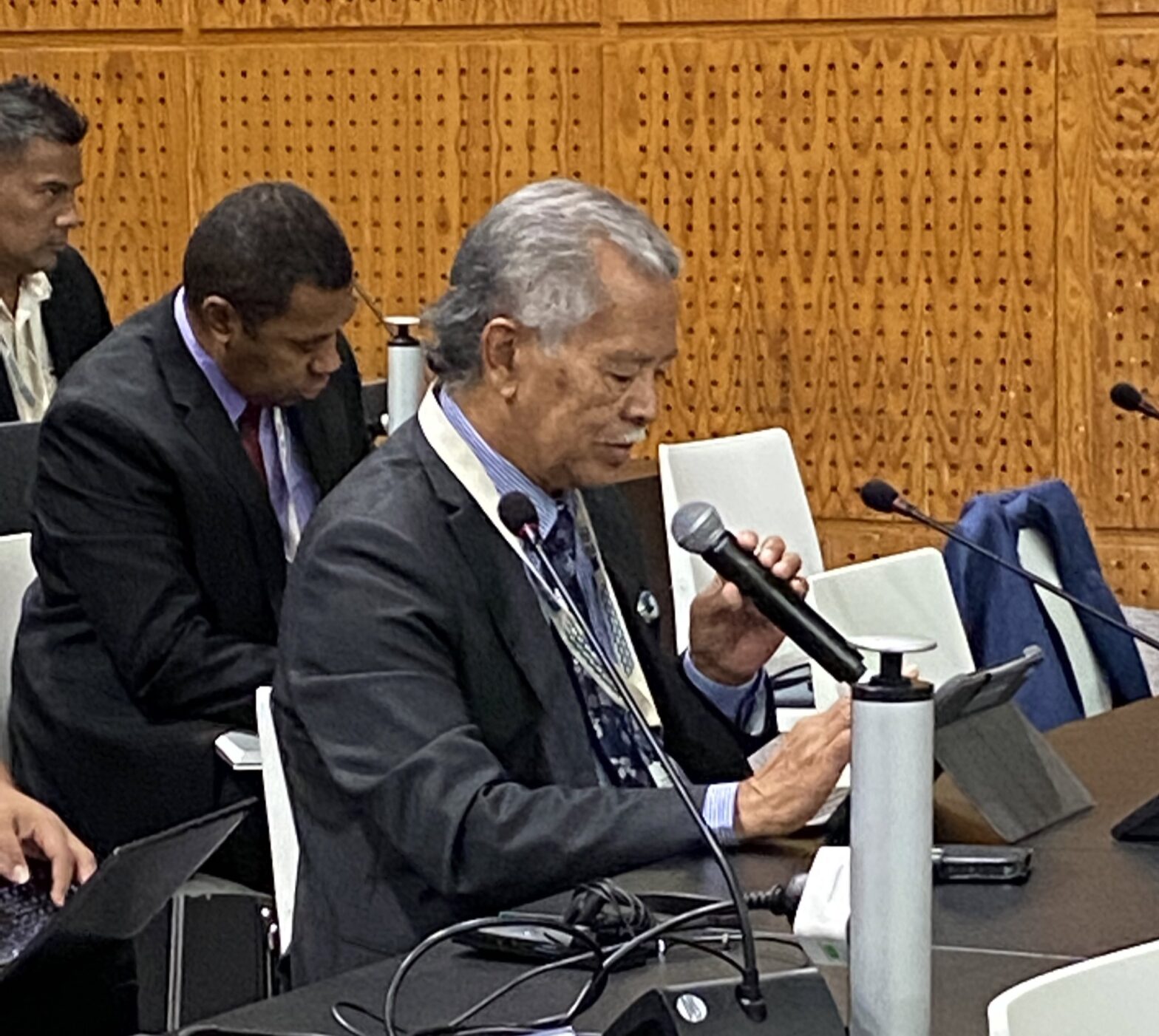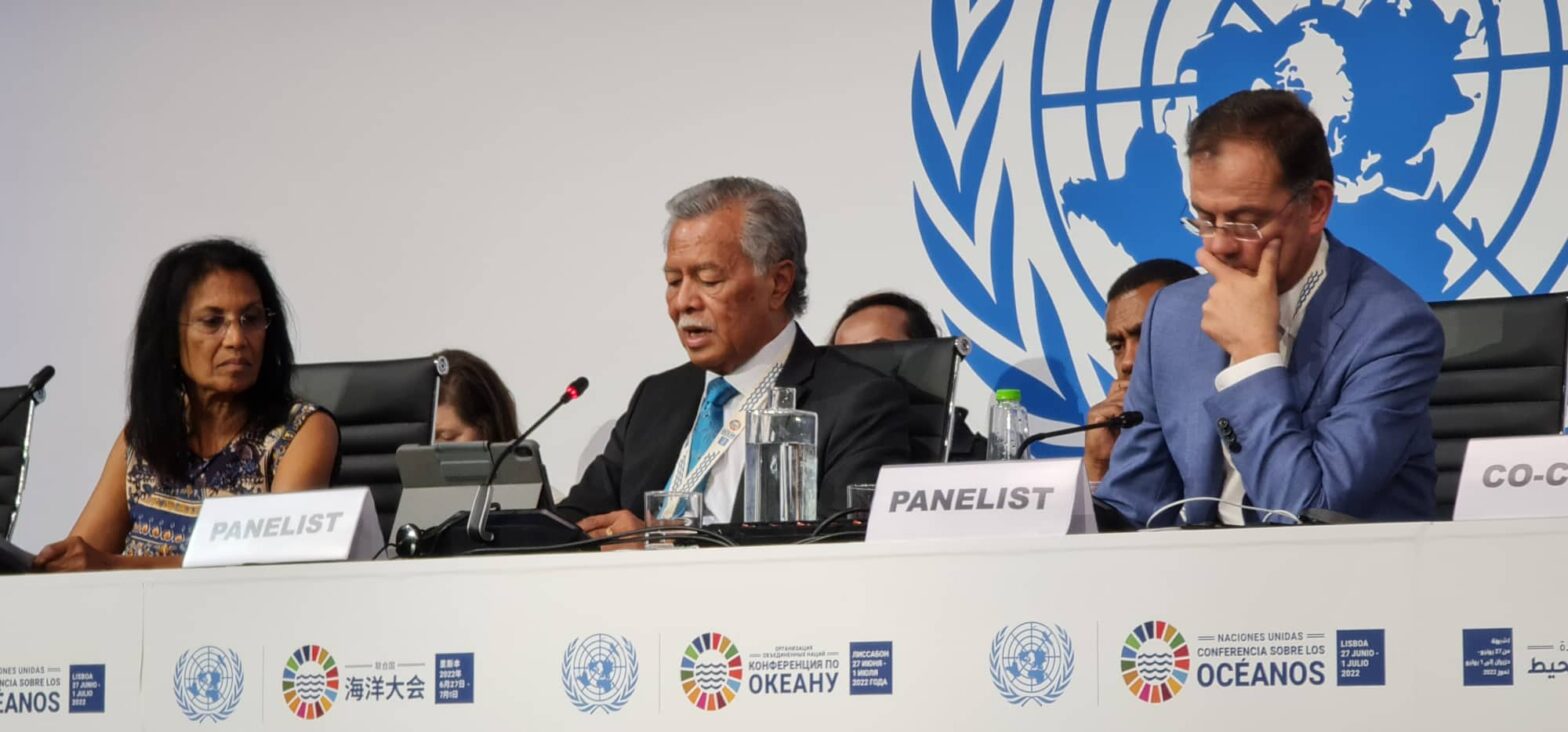SPREP highlighted Moana Taka Partnership as one of the best practice solutions for addressing marine pollution being practiced in the Pacific
The Secretariat of the Regional Environment Programme (SPREP) at the 2022 United Nations Ocean Conference (UNOC) shone the spotlight on the Moana Taka Partnership (MTP), where Swire Shipping vessels carry containers of recyclable waste from Pacific Island ports to ports around the Pacific Rim to be sustainably treated and recycled in accredited facilities.
The Director General of SPREP, Sefanaia Nawadra, highlighted this as one of the best practice solutions for addressing marine pollution being practiced in the Pacific, to a global audience in Lisbon, Portugal. He was speaking during a side event titled “Depolluting oceans through controlling trade in plastic wastes and combatting illegal traffic under the Basel Convention,” co-hosted by the Secretariat of the Basel, Rotterdam and Stockholm Conventions/UNEP and the United Nations Office on Drugs and Crime (UNODC).
Held at the Altice Arena, it was facilitated by Executive Secretary of the Basel, Rotterdam, and Stockholm Conventions, Rolph Payet. It featured the Principal Secretary, Ministry of Environment and Forestry, Kenya, Chris Kiptoo, the Director General, Norwegian Agency for Development Cooperation, Bård Vegar Solhjell, Minister of Agriculture, Climate Change and Environment, Seychelles, Flavien P Joubert, Minister of Environment, Climate, Tourism and Hospitality Industry, Zimbabwe, Nqobizitha Mangaliso Ndlovu, Legal Officer, the United Nations Conference on Trade and Development (UNCTAD), David Jose Vivas Eugui, Crime Prevention and Criminal Justice Officer, the United Nations Office on Drugs and Crime (UNODC), Anne-Linn Jensen and Country Administrative Board of Norrbotten, Environmental Protection Agency, Government of Sweden, Jonas L Lundin.
“Public private partnerships is something we talk about all the time, but very rarely do we have a good example. We are fortunate that in the Pacific that we have one in the Moana Taka Partnership,” Nawadra said. He referred to the Moana Taka Partnership, when he highlighted the aspirations and experiences of the Cleaner Pacific 2025, a comprehensive long-term strategy for integrated and sustainable waste management and pollution prevention and control in the Pacific islands region from 2016–2025. The Clean Pacific 2025 is based on six key steps namely regional data collection; development of policies and regulations; promotion of public private partnerships; implementation of best practice; improvement of human capacity; and promotion of best practices through regional exchange and community education.
“What we face in the Pacific is also representative of what other SIDS regions face,” the Director General said. “In the area of waste, the Pacific has the Cleaner Pacific 2025 which provides us with the confidence and long-term strategy.”
The Pacific contributes less than 1.3% of mismanaged plastic pollution yet is grossly and disproportionately affected by its impacts. Every day approximately eight million pieces of plastic pollution find their way into the ocean with approximately 12 million tonnes of plastic being poured into the oean every year. A lot of solid waste, including plastics end up in the Pacific, affecting lives.
The MTP was birthed from the realisation of this grim reality. In December 2017 at the United Nations Environment Assembly in Nairobi, SWIRE Company, then known as China Navigation Company, started the discussion with SPREP. Three months later in 2018, a memorandum of understanding (MOU) with SPREP was signed. From just three shipments at the start, the Moana Taka Partnership has grown from strength to strength with more than 100 shipments sent to different countries which process recycling materials in Asia Pacific. It has also expanded recycling capabilities to liquid waste such as used oils, which can then be recycled back into mechanical lubricants.
But there is room for growth. The General Manager Sustainable Development Division SWIRE Shipping, Simon Bennett, who is also attending UNOC after the announcement of the partnership becoming global, reiterated what he said during the 3rd Clean Pacific Roundtable: “Tell us what you’ve got. Tell us where you want to send it to because we, as a shipping company, have no knowledge or expertise in that area. There is nowhere on our route network that we cannot ship from and there is nowhere on our route network that we cannot ship to. So, if you know where you can ship it to, we will provide the container for free, and we will ship it for free to a place where it can be responsibly recycled.”
In Lisbon, Director General Sefanaia Nawadra said the partnership is not just about removing plastics but also making sure they are responsibly disposed of at the end destination. He also used the opportunity to highlight some of the challenges of implementing the Clean Pacific 2025. For instance, when it comes to collecting data, he said: “The MEAs are changing all the time so we need to keep pace with that. A lot of our work is focused on helping our member countries with national implementation.”
With regards to the implementation of best practices, Nawadra said this needs to be contextualised. “What applies in Europe, what applies in the U.S. cannot just be taken and applied to SIDS context. What we need to do is test those ideas out to be sure that what is passed on to all our members is applicable and practical for the situations that they face. It is a key role that we at SPREP continue to play for our members.”
The value of capacity building on a regular basis was also highlighted. “In SIDS, you have to train people 24/7 because there is always a big turn over of staff, once people get trained up, there is always a demand for them to go somewhere else. We cannot prevent them from going, so we need to continue to train our young people in areas we need them to become technical managers and experts in.”
SPREP has the lead responsibility for regional coordination and delivery of waste management and pollution control action and uses the strategic management framework, Cleaner Pacific 2025, in guiding regional cooperation and collaboration. SPREP is also the Secretariat of the Noumea Regional Convention, the Waigani Convention, and most recently became the Pacific Regional Centre for the Basel Convention.
The Second UN Ocean Conference is hosted in Lisbon, Portugal from 27 June to 1 July 2022. The Pacific Islands are represented by a strong contingent, which includes the Leaders from Fiji, Palau and Tonga. Also present are the Cook Islands, Federated States of Micronesia, Fiji, French Polynesia, Kiribati, Palau, Papua New Guinea, Republic of the Marshall Islands, Samoa, Solomon Islands, and Tonga, Tuvalu and Vanuatu.
This story was written by Sosikeni Lesa, originally published at SPREP on 29 June 2022, reposted via PACNEWS.




